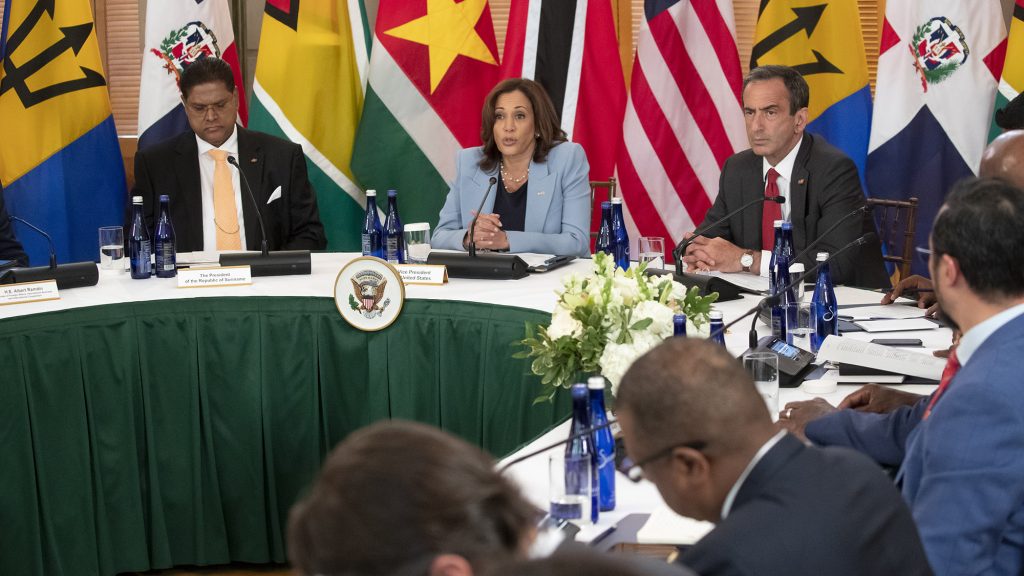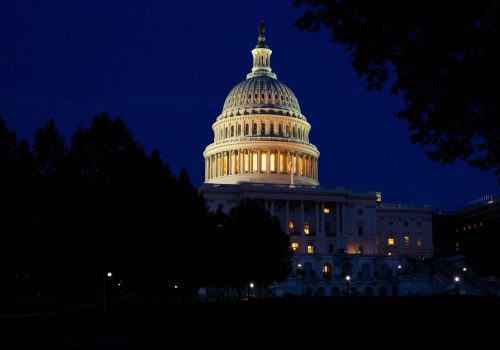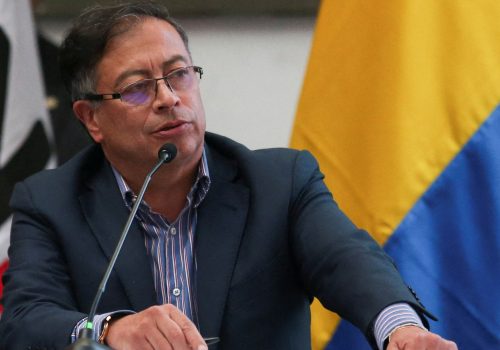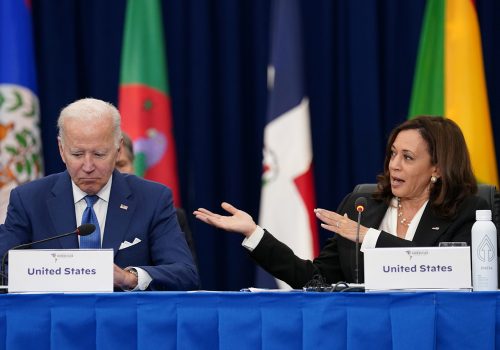On Thursday, the leaders of five Caribbean countries got together with US Vice President Kamala Harris in Washington to explore ways to improve cooperation between the United States and the region, following up on commitments made at the Summit of the Americas in Los Angeles in June. So what did Suriname President Chan Santokhi, Barbados Prime Minister Mia Mottley, Guyana President Irfaan Ali, Trinidad and Tobago Prime Minister Keith Rowley, and Dominican Republic President Luis Abinader walk away with? We reached out to our experts from the Adrienne Arsht Latin America Center to break down the new commitments from the White House and how this diplomatic relationship can improve in the future.
There were plenty of big promises made regarding the Caribbean at the Summit of the Americas. Is the United States delivering?
One of the important wins of the Summit was the US prioritization of new steps that could be taken to deepen US-Caribbean ties. For too long, US policy toward the Caribbean has ebbed and flowed based on crises rather than forging a long-term strategy for cooperation based on shared interests and priorities. That is now changing, but with much work ahead.
The US-Caribbean Partnership to Address the Climate Crisis 2030 (PACC 2030)—announced at the Summit—is a tangible US response to the immediate and long-term needs of the Caribbean in terms of climate and energy resilience. And the Biden administration is acting on it. US and Caribbean policymakers have met more in the past few months than they have over the past several years—all with a focus on the technical implementation of PACC 2030. While there is a long way to go, new actions announced today by the vice president to help support access to finance, food production, and energy security show that the United States is on the right track.
—Jason Marczak, senior director of the Adrienne Arsht Latin America Center
After today’s meeting, there’s room for optimism that the United States is in the process of delivering on its commitments. Initially, PACC2030’s framework was vague, but the action items released from today’s meeting are starting to fill in the blanks. Sending a multi-agency delegation to assess the region’s energy potential is an important first step, as is working closely with the World Bank and the Inter-American Development Bank to create more finance mechanisms for Caribbean governments. It also shows that the US approach is becoming comprehensive and holistic, bringing together the US Agency for International Development (USAID), the Commerce Department, the State Department, the Development Finance Corporation, and others to engage with Caribbean partners.
—Wazim Mowla, assistant director of the Caribbean Initiative at the Adrienne Arsht Latin America Center
What’s the significance of this meeting, and how has Harris handled her role as point person for the region?
This meeting is an important follow-up to the commitments to the Caribbean made by the Biden-Harris administration at the Summit of the Americas in Los Angeles in June. The vice president is effectively playing a similar role to that played by then Vice President Joe Biden when the Caribbean Energy Security Initiative was launched in 2009, and her leadership will be critical for meaningful US cooperation in energy security, access to finance, and food security.
—Riyad Insanally, senior fellow at the Caribbean Initiative at the Adrienne Arsht Latin America Center, former ambassador of Guyana to the United States
Today’s meeting is significant when put into a larger context. A longstanding challenge to US policy in the Caribbean is its lack of consistency. The frequent meetings that Harris has had with Caribbean leaders this year seem to remedy this for the moment. Having someone dedicate their time to the region, especially at the vice presidential level, sends a clear message to the Caribbean that these governments and their challenges matter.
—Wazim
How do the White House’s commitments to energy security align with the region’s own energy goals?
The White House’s commitment to strengthening regional energy security by providing greater access to financing, clean energy sources, and infrastructure is well-aligned with the Caribbean’s own goals. The focus on renewable energy should, however, be broadened to take into account the region’s dual-energy reality, with Guyana, Suriname, and Trinidad and Tobago seeking to maximize the potential of their oil and gas reserves in order to help offset global price volatility, finance their own transition to renewables and low-carbon development, and anchor energy security in the Caribbean.
—Riyad
How does the White House commitment to food security build on or complement the region’s own strategy?
Food security is a major issue for the Caribbean and for the larger region as Russia’s war in Ukraine puts pressure on the global food supply. Given the degree to which Caribbean nations rely on food imports, each country is particularly vulnerable to food scarcity as well as price fluctuations. This places an enormous burden on people across the Caribbean. Importantly, earlier this year, the heads of Caribbean countries announced a new plan to decrease the region’s food import bill by 25 percent by 2025. US food-security actions announced today will help in that goal and will also help with the short-term needs of the region. Sending advisors to the region and the quick injection of $28 million in assistance are an important starting point for mitigating the rise in food prices.
—Jason
Is the White House doing enough to address the struggles of the Caribbean finance sector around de-risking?
The White House’s intention to announce a US-Caribbean Public-Private Bank Dialogue is a significant step in trying to address de-risking in the region. The challenge will be ensuring that the most affected Caribbean actors are incorporated into this dialogue. Also, US regulators and US banks need to be brought to the table, as they are often the missing piece in these types of forums. It will also be important that the dialogue is built in coordination with existing US efforts, particularly legislation emanating from the US House Financial Services Committee, which held a hearing on this issue just this week.
—Wazim
Further reading
Wed, Sep 14, 2022
The Atlantic Council’s Wazim Mowla Provides Testimony at US House Financial Services Committee Hearing on Caribbean Financial Inclusion
Testimony By Wazim Mowla
Adrienne Arsht Latin America Center Assistant Director Wazim Mowla testifies to the House Committee on Financial Services regarding financial inclusion in the Caribbean
Fri, Aug 5, 2022
Colombia’s first leftist president is taking office. What should the US expect from him?
New Atlanticist By
We reached out to our top Latin America minds to break down what a Gustavo Petro presidency will mean for this longstanding strategic relationship.
Fri, Jul 22, 2022
Three ways the United States can prove it’s invested in its relationship with the Caribbean
New Atlanticist By
The United States has a short window to carve out a new diplomatic and economic era in its relationship with the Caribbean Community.
Image: US Vice President Kamala Harris participates in a multilateral meeting with Caribbean and Dominican leaders, beside President of Suriname Chan Santokhi (L) and National Security Advisor to the Vice President Phil Gordon (R), in the Blair House across the street from the White House in Washington, DC on September 15, 2022. Photo via Reuters.



